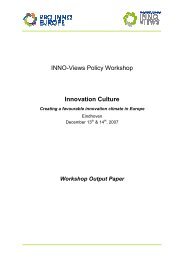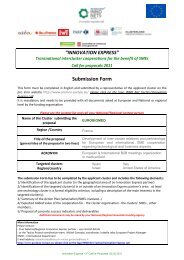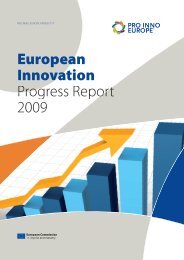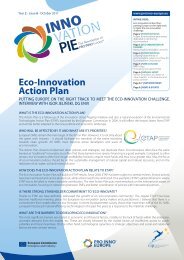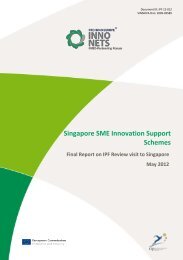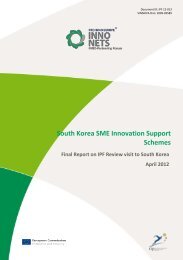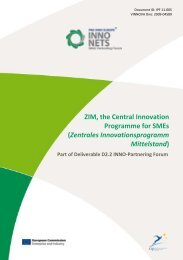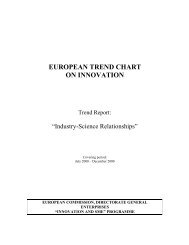Benchmarking National - PRO INNO Europe
Benchmarking National - PRO INNO Europe
Benchmarking National - PRO INNO Europe
You also want an ePaper? Increase the reach of your titles
YUMPU automatically turns print PDFs into web optimized ePapers that Google loves.
45 % reported using patent agents. This figure places the patent attorneys third on<br />
the list of service providers used, after national and regional technology/<br />
development agencies. If one considers only “frequent” usages, patent attorneys<br />
are even in the lead by 3 %-points. This picture is observed not only at the<br />
aggregate level, but also at the level of most of the individual services analysed.<br />
Together with anecdotal evidence collected in the course of the user survey, one<br />
can assert that patent attorneys are of vital importance for the functioning of the<br />
public IPR support system:<br />
1. Patent attorneys seem to be the first choice of many SMEs when<br />
they are concerned with issues covering IPR. The expectations regarding<br />
the know-how of patent attorneys are quite high among SMEs, and there are<br />
indications that many SMEs do not know how to put the patent agents to their<br />
best use (see also section 5.4.4 on patent information services)<br />
2. Many public support services act as entry point services for patent<br />
attorneys. Cases in point are especially open day services organised by<br />
technology centres/incubators or chambers of commerce. Similar “open days”<br />
are also offered by patent information centres (see German Patent Information<br />
Centre Stuttgart, annex I, case study nr. 2). Referral services, such as the ones<br />
operated by the IOI service or the Irish IPAS scheme also have an entry point<br />
function for patent attorneys (see the respective case studies in annex I).<br />
3. Evidence has been found to support the argument that patent attorneys<br />
help SMEs in successfully applying for and using public IPR support<br />
schemes. For example, the support from patent attorneys can be considered<br />
quite important for the success of the German INSTI SME Patent Action<br />
service, as they often help SMEs in the application process for the subsidy (see<br />
INSTI SME Patent Action, annex I, case study nr. 1).<br />
4. Patent attorneys use public support services targeted at SMEs<br />
themselves. This especially refers to patent search services, with the help of<br />
which patent attorneys conduct searches on behalf of SMEs.<br />
The above mentioned points show instances where the private sector service<br />
offerings of patent attorneys and the public service provisions are complementary<br />
and appear to serve the needs of SMEs.<br />
There seems to be, however, one type of service activity – patent database<br />
search services – which may become increasingly a conflict zone between<br />
private and public service providers (see also section 5.4.4). Some patent<br />
attorneys and especially firms focusing on conducting patent scans seem to fear<br />
that newer service offerings of patent offices will eventually drive them out of the<br />
market, if the scope of the search services widens. Examples to this end are only of<br />
an anecdotal nature, but nonetheless help to illustrate the possible problems:<br />
� The introduction of the IOI service in the Netherlands and its focus on patent<br />
scans prompted concerns of a patent attorney who filed a complaint for reasons<br />
of unfair competition. In order to avoid controversy, it was decided to alter the<br />
design of the support programme in such a way as to create a win-win situation<br />
for all involved. This “new” IOI service design only educated SMEs on the<br />
benefits of using patent information and performed only a very first patent<br />
search for them. For subsequent searches, IOI referred the SMEs to patent<br />
attorneys/commercial parties (sometimes subsidising them). Using this<br />
approach, IOI managed to increase the awareness and knowledge of SMEs,<br />
while at the same time acting as a market enlarger and catalyst for the private<br />
service sector. According to experts, this mode of operation works rather well.<br />
� According to Lagemaat and Frackenpohl (Lagemaat & Frackenpohl, 2005), the<br />
information policy of the EPO regarding the future evolution of its freely<br />
available patent databases raised concerns among private patent information<br />
service providers in the late 1990s: On the one hand, the EPO stressed that it<br />
would still offer only low-level services for free (in order to allow for the general<br />
95<br />
TOWARDS GOOD PRACTICES – THE REAL WORLD OF IPR SUPPORT SERVICES






